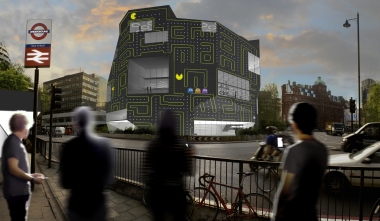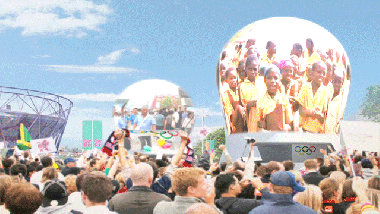London-based design practice 00:/ ∫(‘zero zero’), in partnership with Space Station, have published proposals for the redevelopment of the Old Street roundabout in East London. The proposals outline a new enterprise and start-up institution at the central hub of Old Street, Hoxton and Shoreditch; an area which in recent years has been dubbed ‘Silicon Roundabout’ due to the rising success of new technology and .com enterprises concentrated in the area.
At a time when much of the economic and employment news in the UK makes for gloomy reading, Silicon Roundabout stands out as a remarkable success story, with a number of successful British technology companies emerging in one small area, and myriad new start-ups seeking to establish themselves in the area. Yet the roundabout which gave its name to this phenomenon remains, by contrast, unloved and fallow but for a small number of popular shops which inhabit the concrete underpass.
Boosted by government support for the ‘Tech City’ emerging in the East of London, the effort is now on to bring together investors, backers and the tech community to build upon this emerging London success story. “The roundabout is a landmark opportunity to articulate and amplify what is happening in the area”, explains Space Station director Russell Chopp.
Architecture and strategic design practice 00:/, themselves based in the area, have led the design for the proposals. They are already leaders in innovative enterprise environments and future workspaces: having been co-designers and partners behind the Hub network in London, which provides collaborative workspace for social entrepreneurs. Not surprisingly then, their proposals go far beyond the kind of corporate office design often associated with business campuses.
“It’s partly about realising why this place is already successful in the first place”, explain 00:/. “This is an economy which works in a completely different way, it’s far more open, far more sociable. It’s about the aggregation of many small, energetic, and rapidly growing start-ups with a sharing culture rather than single, large corporate setup which have driven the design of the sort of office buildings we got used to during the boom.”
Their proposal has a number of key distinctive features. First, the base of the structure is not a corporate lobby or a shopping mall, but a large, enclosed public space.
“In a sense, it’s about realising that London already has another major public space, sitting there, waiting to be found, used and loved” say the designers. “It should be something like a cross between Trafalgar Square and Grand Central Terminal in New York.”
The design has to respond to the very tight constraints of building around an existing underground and railway station, located at the centre of one of London’s busiest traffic junctions. Its structure and construction would have to be strongly shaped by these factors.
The resultant building, sitting astride this new public space, could not be more different from the glass office buildings of the City of London a few hundred metres further south. Not a series of floor plates, but a kind of city-within-a-city.
Within this compact city would be workspaces for companies which range in size from large to tiny, as well as shared resources and flexible workspaces for start-up enterprises of only one or two people.
On the outside, the faceted facade is a vast, programmable advertising board, reminiscent of Tokyo’s Shinjuku district. “We’re told the advertising space on the roundabout is some of the most expensive in Britain. Rather than resist that, we saw an opportunity in turning that onto its head, by opening the whole thing up. By selling the façade per pixel, per minute, the building creates a system which allows small, local companies, individuals and online campaigns to use it, alongside the big global players.” The result is a kind of neighbourhood-based ‘million-dollar homepage’, reflecting outwardly the energetic entrepreneurialism which is driving the change in this part of London.
Click here to download the press release as a pdf:












